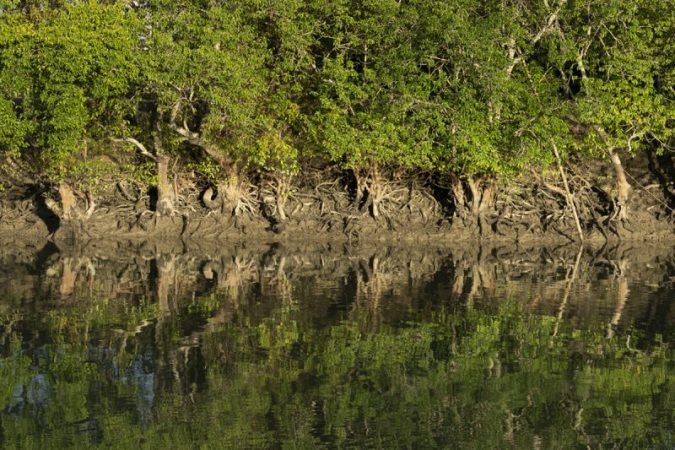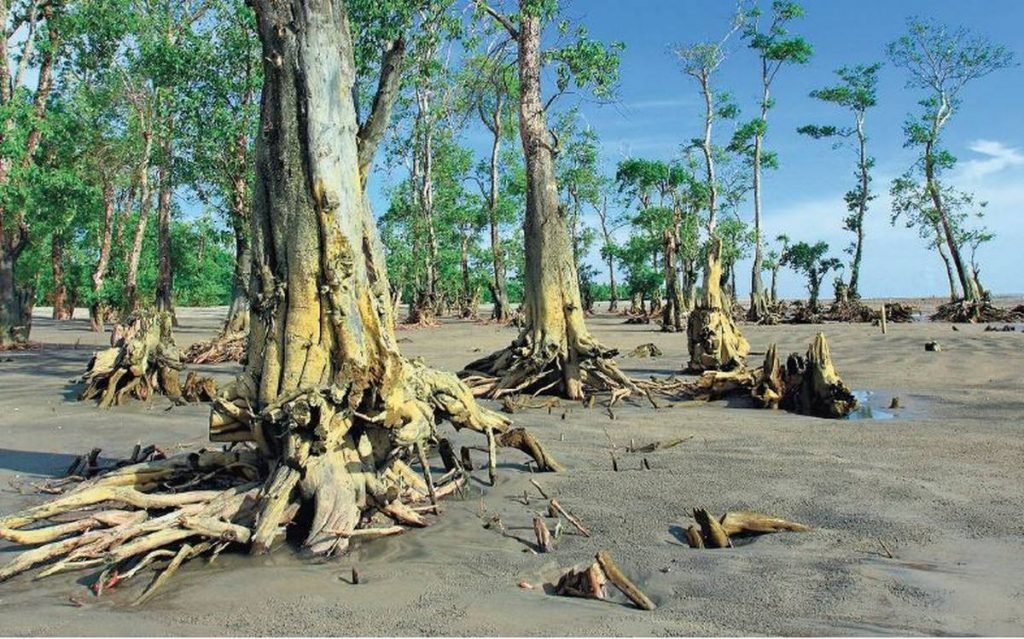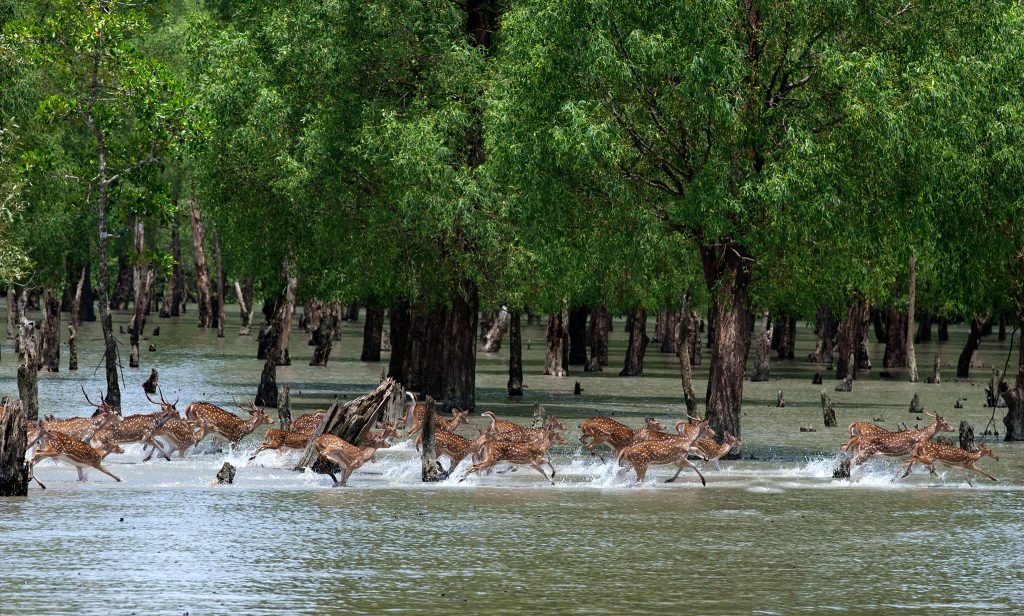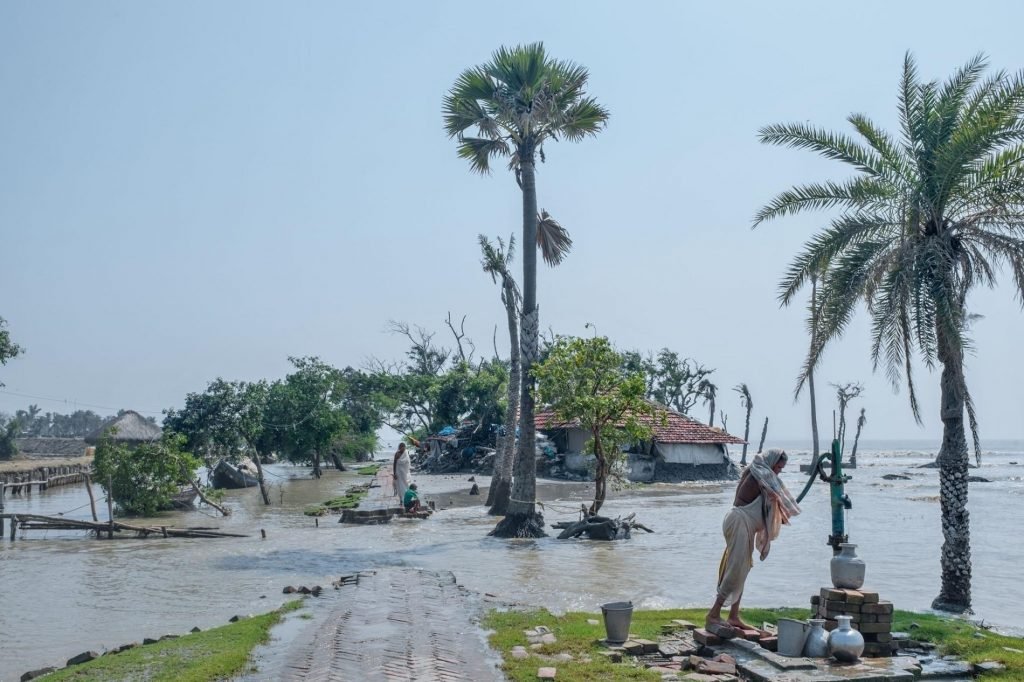Globalization and Climate Change: A Case Study of Sundarbans

In the words of Anthony Giddens, globalization is defined as “the intensification of worldwide social relations which link distant localities in such a way that local happenings are shaped by events occurring many miles away and vice versa”. In other words, globalization is the concept and process of developing interconnections beyond borders. These interconnections are broadly divided into economic, political and cultural dimensions. Globalization is the “flow” of economic, political and cultural aspects, thus transforming our identities from one of national/local to global. Some scholars assert that globalization is the product of modernity, while others emphasize that economies, governments and people become modern due to globalization. However, whether globalization is good or bad is debatable, but surely it has its own implications on society.
The Intergovernmental Panel on Climate Change (IPCC) defines global climate change or “global warming” as “a change of climate which is attributed directly or indirectly to human activity”. Such human activities may be the result of capitalism, individualism and neo-liberalism (economic dimension), modernity, pride for localism/nationalism, neo-realism and utilitarianism (political dimension) and science itself (cultural dimension). Post industrialisation modern society didn’t consider “Nature” as an integral part of our lives. Laissez-faire capitalism, deregulatory economic policies, the emergence of violent wars in the 20th century and an increase in trade practices are all responsible for global climate change. A postmodern society focused on cooperation and as consequence globalization of scientific culture intensified. Global scientific research and advancements have created a global consciousness about greenhouse gas emissions and climate change. Ironically, the developed West has contributed to carbon emissions for decades which will not be affected much due to climate change but the Global South countries will have to face the consequences of climate change.

Warming up of the Earth’s surface is changing the monsoon and cyclone patterns in South Asian countries. Countries like India and Bangladesh are frequently facing severe cyclonic storms leading to severe damage to the coastal areas of these countries. The Sundarbans on the eastern coastal areas of West Bengal in India and the western coastal areas of Bangladesh is a contiguous chain of mangrove trees which play an important role in preventing the inland areas from severe damage due to coastal erosion, tidal onslaughts and natural calamities. However, the mangrove forests are dying and animals living there are becoming endangered or completely extinct.
The Sundarbans are the world’s largest mangrove forest and is the home of a large number of flora and fauna including the “Royal Bengal Tiger”. Illegal clearance of forests, digging fishing ponds and digging for oil, lumbering and collecting honey commercially are destroying the natural habitat. The great inflow of foreign tourists has increased employment as well as recognition of the forest at the international sphere. However, unregulated use of boats from Calcutta to Dhaka to carry tourists has caused oil spills. Tourism has also generated litter, posing serious threats to the ecological habitat. Many small islands are on the verge of sinking due to rising sea levels. Clearance of mangrove trees to create “mangrove pathways” for tourists have left stretches of mangrove vegetation reduced to greyish landscape of sediments where tree stumps stick out like dead sticks.
The level of literacy and education is very low in the small villages of Sundarbans which has led to lack of social security, informalisation of employment and migration of residents (especially male) to other cities or states in search of jobs. Therefore, the residents resort to dangerous activities in the forest at the expense of their lives. Digging of ponds and opening a channel to the sea will increase the salinity of the soil and make it unfit for farming. In the year 2012, the proposed Rampal Thermal Power Project, a joint initiative by the governments of India and Bangladesh posed serious threats to the ecology of Sundarbans. Civil society organisations and environmentalists both from inside and outside the countries protested against the draconian project. UNESCO and International Union for Conservation of Nature (IUCN) expressed ugly thoughts about the coal-fired project within 4kms of ecologically critical area (ECA) of the Sundarbans. The power plant also threatens to displace over 3500 land-owning families and other dependents on the forest for life. Despite strong resistance, the project continues to work.
Shrimp cultivation in Sundarban has become a lucrative means of livelihood. Due to the high salinity of soil and frequent storms, flood cultivation is a hardy task in Sundarbans. Thus, people have shifted to shrimp cultivation as an alternative because it appeared to be paying more than agriculture. Shrimp cultivation is, however, harmful for the environment of Sundarbans. Shrimp cultivation erodes the mud dykes that prevents entry of saline water inland, also constant treading of mangrove roots in search of shrimp seedlings destroys the trees. Faulty collection of shrimps from the sea also disrupts the aquatic fish population of the delta.
Demand for crabs from other Asian countries like Japan, Malaysia, China, Thailand, Singapore, Taiwan and South Korea have shifted employment of some from shrimp to crabs. The global demand has provided a transnational dimension to the popularity of Sundarbans. Crab cultivation is more environment friendly than shrimps, but this new source of income depends on international demand, and bitter diplomatic relations with these countries can worsen the trade practices.

Climate change is not limited to the local. Carbon emissions in the distant West affect climate everywhere. Neo-liberalisation and globalization policies have allowed unchecked emissions into the atmosphere and have made coastal ecology fragile and vulnerable. Rising temperatures of the earth’s surface will force coastal populations to migrate due to climate crisis.
International Relations Theory having been dominated by neo-realism recognizes an anarchic international sphere which cannot be governed by global governance. Yet, in the view of neo- relists this is true. International cooperation for climate change policies undertaken by the UN Framework Convention on Climate Change lacks authority necessary for implementation, monitoring and enforcement of policies in every member country. A recommendation by the IUCN to add Sundarbans in the list of World Heritage Sites in Danger due to the Rampal Thermal Power project was refused by UNESCO chaired by China because of Indo-China geopolitical relations in the region.

Ecological modernization is a theory that promotes emission trading and tax breaks for renewable resource industries and technologies. However, it may stand against national ecological standards. International trade is beneficial for countries with higher comparative advantages. It leads to growth and development of economies. Economic, political and cultural globalization has brought South Asian countries to the global market. Thus, deglobalizing the existing structure can exacerbate the ecological balance of nature. Therefore, rather than deglobalizing, governments should decentralise powers to local sustainable governments to reduce emissions locally, reform the economic structure through ecological modernization and cooperate with other governments at an international sphere to reduce climate change.
References
Malone, E. L. (2002). Hot Topics: Globalization and Climate Change. Social Thought and Research, 143-173.
Steger, M. B. (2009). Globalization: A Very Short Introduction. New York, United States: Oxford University Press Inc.


















